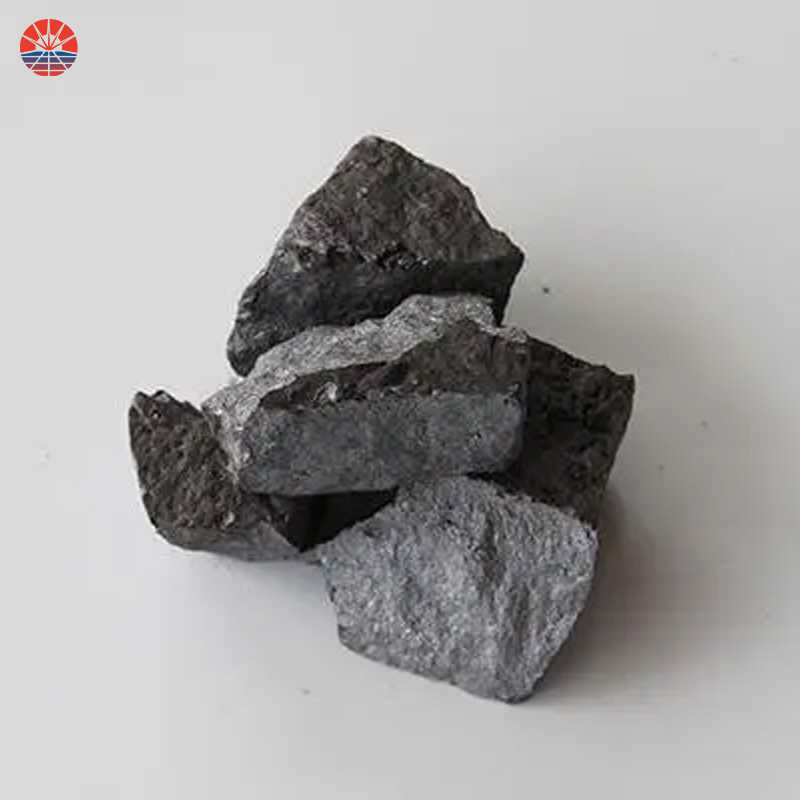Ferrosilicon Barium Manganese Zirconium Inoculant
Ferrosilicon plays a crucial role in steel production as it is commonly used as both a deoxidizer and an alloying agent. Here's how ferrosilicon is used in steelmaking:
Deoxidizer: During steelmaking, molten iron is typically converted into steel by removing impurities, and this process requires deoxidation. Oxygen is one of the most common impurities present in molten iron, and if not removed, it can lead to undesirable effects on the steel's properties, such as porosity, brittleness, and reduced mechanical strength. Ferrosilicon is added to the molten steel as a deoxidizer, reacting with the oxygen present to form silicon dioxide (SiO2) and carbon monoxide (CO) gas:
2Fe + O2 → 2FeO (oxidation of iron)
2FeO + Si → 2Fe + SiO2 (reduction with ferrosilicon)
The silicon in ferrosilicon acts as the reducing agent, combining with oxygen to form silicon dioxide, which rises to the surface as slag. This deoxidation process ensures that the final steel product is of high quality with reduced oxygen content.
Alloying agent: Ferrosilicon contains a significant amount of silicon, which is an important alloying element in steel production. Controlled additions of ferrosilicon allow steel manufacturers to achieve specific desired properties in the steel. The addition of silicon improves various aspects of steel:
Increase in strength and hardness: Silicon enhances the strength and hardness of steel, making it more suitable for structural applications and high-stress environments.
Improved magnetic properties: Silicon is beneficial in the production of electrical and magnetic steels.
Grain refinement: Silicon helps in refining the grain structure of steel, resulting in improved mechanical properties and better workability.
Different grades of ferrosilicon with varying silicon content are used based on the steel's intended properties and application requirements.
Overall, the usage of ferrosilicon as a deoxidizer and alloying agent in steel production is vital for obtaining high-quality steel with specific desired properties. By controlling the amount of ferrosilicon added during steelmaking, manufacturers can tailor the steel's composition to meet the needs of various industries, such as construction, automotive, machinery, and many others.
What's The Benefit To Using Ferrosilicon In Steel Production
Using ferrosilicon in steel production offers several important benefits, making it a crucial additive in the steelmaking process. Some of the main advantages of using ferrosilicon in steel production include:
Deoxidation: One of the primary uses of ferrosilicon in steelmaking is as a deoxidizer. During the steelmaking process, oxygen and other impurities can be present in the molten steel. Ferrosilicon, with its high silicon content, reacts with the oxygen, forming silicon dioxide (SiO2) and removing it from the steel. Deoxidation helps to improve the steel's cleanliness and overall quality by reducing the presence of harmful oxides and preventing defects in the final product.
Alloying agent: Ferrosilicon is an essential alloying agent in steel production. By adding ferrosilicon to the molten steel, manufacturers can introduce silicon into the alloy. The presence of silicon imparts several desirable properties to the steel, including increased strength, hardness, and resistance to wear and corrosion. Additionally, silicon can help improve the magnetic properties of certain specialty steels.
Grain refinement: The addition of ferrosilicon can help refine the grain structure of steel during solidification. Fine-grained steel exhibits improved mechanical properties, such as higher strength and toughness. Grain refinement is essential in producing high-quality, high-strength steels used in various structural and engineering applications.
Controlled composition: Ferrosilicon allows for precise control over the composition of the steel. Different grades of ferrosilicon with varying silicon content can be used to achieve the desired steel grade with specific mechanical and metallurgical properties. This control over alloy composition is critical for tailoring the steel to meet specific industry and application requirements.
Economical production: Ferrosilicon is relatively abundant and cost-effective compared to some other alloying elements. Its use as a deoxidizer and alloying agent makes steel production more efficient and economical.
Improved workability: Steel with appropriate silicon content is easier to work with during various processing stages, such as rolling, forging, and machining. This enhanced workability contributes to the ease of manufacturing steel products with complex shapes and designs.
Specialized steel production: In the production of specialty steels, such as electrical steels and certain stainless steels, ferrosilicon is used to control the silicon content and achieve specific magnetic or corrosion-resistant properties.
Overall, the use of ferrosilicon in steel production is essential for enhancing the quality, strength, and workability of the steel. It enables manufacturers to produce a wide range of steel grades suited for various industrial applications, including construction, automotive, machinery, energy, and infrastructure.
Specification
Quality inspection certificate of finished product | |||
Product name | Ferro Silicon | Batch No. | ZC2023-06-13 |
Sampling Site | / | Product specifications | / |
Acceptance date | 2023.06.13 | Report date | 2023.06.14 |
Test items | SH/T 0313-92 | Test results | |
Appearance | This product should be black solid | ||
Si | 75.32 | ||
c | 0.11 | ||
P | 0.03 | ||
s | 0.014 | ||
A1 | 0.77 | ||
Conclusion | Product conforms to specification. | ||








